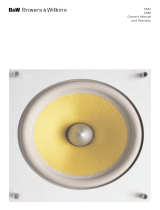
6
ARIA 900
™
SERIE
User manual
Attaching the base to the cabinet (926, 936, 948)
To attach the base to the cabinet, firstly turn the cabinet over so that it is resting on its top (on the packaging padding),
taking care not to damage the cabinet-work, glass top-plate or speaker cones when carrying out this operation.
Position the base on the cabinet and screw in the four screws provided. Tighten the screws using the Allen key (fig. A).
Connections
The Aria 900 connectors provide reliable, multi-purpose contacts for stripped cables (up to 4 mm diameter) or
fork terminals. Banana jacks are covered for compliance with electrical and connection standards in force in some
countries. Do not remove the plastic covers.
It is essential to connect the loudspeakers using the correct polarity. The connector marked " + " must be connected
to the matching output on the amplifier and the connector marked " - " must be connected to the negative terminal
(fig. B). If the loudspeakers are connected with incorrect polarity there will be considerable degradation to both the
stereo image and the audio perception of bass.
Where to position your loudspeakers
Your Aria 900 loudspeakers have been designed to reproduce as faithfully as possible every kind of music and home
cinema programme. Nonetheless, it makes sense to follow some simple rules to optimise their performance and to
guarantee good tonal balance and a realistic sound stage.
The loudspeakers should be positioned symmetrically, facing the listening area, ideally forming an equilateral
triangle with it. It is, however, possible to change these distances to reach the ideal compromise for any particular
conditions (fig. C).
The loudspeakers should be positioned at the same height, in the same horizontal plane. Ideally, the tweeter should
be positioned at the same height as the listener's ear when listening normally (fig. D).
Do not position your loudspeakers too close to a corner of the room and do not place them too close to a wall. If
they are positioned close to a wall or a corner this has the effect of exciting certain resonances within the room and
artificially increasing the bass. Conversely, if the bass level is judged to be insufficient, you could try moving the
loudspeakers nearer a wall to re-balance the bass level (fig. E).
Optimisation
For perfectionists, here is the formula for optimal positioning:
If A is the distance from the centre of the woofer to the nearest floor or wall, B is the distance to the next closest floor
or wall and C the greatest distance (A < B < C), the equation B
2
= AC defines the ideal loudspeaker position.
• For example:
If the centre of the woofer is 50 cm away from the back wall (A) and 60 cm from the floor (B), then the side wall will
ideally be 72 cm away (C = B
2
⁄A = 72 cm) (fig. F).
Recommendations for use
The behaviour of Aria 900 loudspeakers depends on the acoustics in the listening room, on the correct positioning of
the loudspeakers within the room and on the position of the listener. It is possible to work these elements together
to correct or improve a desired effect.
Stereo perception is imprecise and poorly centred : try moving the loudspeakers closer to one another and/or have
them facing the listening point
Sound is harsh, aggressive : the acoustic in your listening room probably has too many reverberations. Consider
using sound softening (carpets, upholstered furniture, wall hangings, curtains, etc.) and sound reflecting materials
(furniture) to absorb or diffuse resonance.
Sound is "flat", "strangled": there are too many sound absorbent items in the room, the sound is soaked up, it has
no relief. Look for the best compromise between sound absorbing and sound reflecting materials in your room.
In general terms, it is good to aim for the wall behind the loudspeakers being reflective for the sound to develop
correctly. The wall behind the listening position, on the other hand, is ideally sound absorbing to avoid rear
reflections "contaminating" the stereo image. Furniture can be judiciously placed near the side walls of the room
to diffuse sound waves and ensure certain frequency zones, particularly in the mid-range, are not excited ("flutter
echo" suppression).
Notice_Aria_900.indd 6 04/03/2019 10:59:27


























